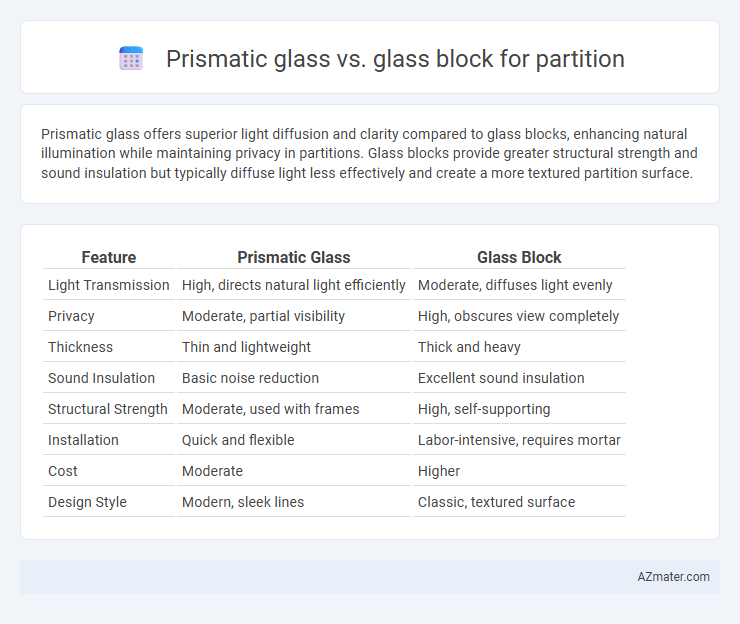Prismatic glass offers superior light diffusion and clarity compared to glass blocks, enhancing natural illumination while maintaining privacy in partitions. Glass blocks provide greater structural strength and sound insulation but typically diffuse light less effectively and create a more textured partition surface.
Table of Comparison
| Feature | Prismatic Glass | Glass Block |
|---|---|---|
| Light Transmission | High, directs natural light efficiently | Moderate, diffuses light evenly |
| Privacy | Moderate, partial visibility | High, obscures view completely |
| Thickness | Thin and lightweight | Thick and heavy |
| Sound Insulation | Basic noise reduction | Excellent sound insulation |
| Structural Strength | Moderate, used with frames | High, self-supporting |
| Installation | Quick and flexible | Labor-intensive, requires mortar |
| Cost | Moderate | Higher |
| Design Style | Modern, sleek lines | Classic, textured surface |
Introduction: Comparing Prismatic Glass and Glass Block for Partitions
Prismatic glass offers superior light diffusion and visual privacy for partitions, enhancing natural illumination without compromising aesthetics. Glass blocks provide robust sound insulation and structural strength, making them ideal for secure, decorative partitions. Both materials serve distinct functional and design purposes in partition construction, depending on lighting and privacy requirements.
What is Prismatic Glass? Key Features and Benefits
Prismatic glass is engineered with microprisms embedded within the surface to refract and diffuse light, enhancing natural illumination while maintaining privacy in partition applications. Key features include UV resistance, impact durability, and superior light diffusion that reduces glare and improves interior ambiance. Benefits of prismatic glass partitions include energy efficiency through optimized daylighting, aesthetic versatility for modern office or residential spaces, and enhanced privacy without sacrificing natural light flow.
What are Glass Blocks? Characteristics and Uses
Glass blocks are thick, translucent units made from molded glass that provide both privacy and natural light diffusion, often used in interior and exterior partitions. Their key characteristics include durability, thermal insulation, sound resistance, and decorative patterns that enhance aesthetic appeal. Commonly installed in bathrooms, office partitions, and exterior walls, glass blocks create light-filled spaces while maintaining structural solidity and privacy.
Aesthetics: Visual Appeal and Design Versatility
Prismatic glass enhances partition aesthetics by refracting light to create dynamic visual effects and subtle color shifts, adding depth and sophistication to any space. In contrast, glass blocks offer a classic, textured look that diffuses light evenly, providing a more traditional and robust design element. The design versatility of prismatic glass allows for custom patterns and modern installations, whereas glass blocks suit architectural styles that emphasize solidity and geometric repetition.
Light Transmission and Privacy Considerations
Prismatic glass enhances light transmission by diffusing natural light evenly while maintaining moderate privacy through its refractive surface. Glass blocks offer superior privacy due to their thick, textured composition but reduce light transmission compared to prismatic glass. Selecting between prismatic glass and glass blocks depends on balancing the need for bright interiors against the desired level of visual privacy in partition applications.
Strength and Durability: Which is More Robust?
Prismatic glass offers superior strength due to its tempered manufacturing process, making it highly resistant to impact and thermal stress, which enhances durability in partition applications. Glass blocks are inherently thick and robust, providing excellent compressive strength and long-lasting performance but are more susceptible to chipping under direct impact compared to prismatic glass. For partitions requiring both strength and durability, prismatic glass typically outperforms glass blocks by combining toughness with advanced impact resistance and versatility in design.
Installation Process: Ease, Cost, and Time Factors
Prismatic glass offers a streamlined installation process due to its lighter weight and standardized panel sizes, reducing labor time and overall costs compared to traditional glass blocks. Glass blocks require skilled masonry work, increasing installation complexity and extending project timelines, often resulting in higher expenses. The ease of handling prismatic glass panels accelerates partition construction, making it a cost-effective choice for projects prioritizing efficiency.
Maintenance Requirements and Longevity
Prismatic glass partitions require minimal maintenance due to their smooth surface, which resists dirt buildup and can be cleaned easily with standard glass cleaners, contributing to their long-lasting clarity and aesthetic appeal. Glass block partitions, while durable and resistant to impact, often have grout lines that demand periodic cleaning and sealing to prevent discoloration and moisture infiltration, potentially increasing upkeep efforts over time. Both options offer longevity, but prismatic glass tends to maintain its pristine look with less maintenance compared to the more labor-intensive care required for maintaining glass block partitions.
Energy Efficiency and Insulation Properties
Prismatic glass enhances energy efficiency by maximizing natural light diffusion while reducing glare and heat gain, contributing to lower cooling costs in interior partitions. Glass block offers superior insulation properties due to its thickness and air-trapping design, providing both thermal barrier and soundproofing benefits. Choosing prismatic glass or glass block depends on prioritizing daylight optimization or robust insulation for energy savings in partition applications.
Prismatic Glass vs Glass Block: Which is Best for Your Partition?
Prismatic glass offers superior light diffusion and modern aesthetics compared to traditional glass blocks, making it ideal for partitions that require both privacy and natural illumination. Glass blocks provide excellent durability and a classic, textured look but tend to transmit less light and are heavier, affecting installation flexibility. For spaces prioritizing sleek design and maximum light transmission, prismatic glass is generally the better choice, while glass blocks suit areas needing robust, decorative partitioning.

Infographic: Prismatic glass vs Glass block for Partition
 azmater.com
azmater.com